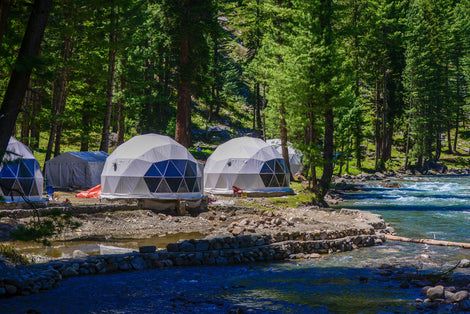Clean Water Solutions for Remote Properties
When you’re living off grid, clean drinking water isn’t something you can take for granted. You’re not connected to city systems, so the work of making water safe falls entirely on your own setup. Whether your source is a well, spring, or you’re collecting rainwater, having a reliable way to filter contaminants can make a big difference in your day-to-day comfort and long-term health.
Remote properties often face more exposure to dirt, minerals, bacteria, and even runoff from nearby land. Some of these may not be obvious to the eye or nose but can still cause trouble over time. That’s where a solid drinking water filtration system plays a major role. It's not about bells and whistles. It’s about handling the basics: safe, clean water for drinking, cooking, and staying healthy.
Why Clean Water Matters
The quality of your drinking water impacts far more than just taste. Water that hasn’t been properly filtered can carry bacteria, sediment, and chemicals that can be harmful if consumed. For someone living off grid, any health issue tied to dirty water is more than just a discomfort. It can present serious problems, especially with limited access to healthcare nearby.
Contaminants like lead, nitrates, chlorine, or waste from animals can find their way into unfiltered water sources. And while boiling water helps with some bacteria, it doesn’t take care of everything. A well-matched filtration system targets a mix of impurities and gives more consistent results. Even reducing traces of sulfur or iron doesn’t just help with taste and smell. It also helps protect appliances and pipes from gunk and grime.
Everyday tasks also feel easier and cleaner when the water is filtered. You get better coffee, dishes don’t feel gritty, and faucets stay cleaner longer. A good filtration system backs up the whole lifestyle, giving you better water and fewer breakdowns down the line.
Types of Drinking Water Filtration Systems for Remote Properties
The right drinking water filtration system depends a lot on your water source and what’s in it. Off-grid homes don’t all use the same feed. Some pull from wells or springs, and others rely on collected rain or river water. That makes it really important to know what kind of contaminants you’re working with first.
Here are a few trusted systems worth looking into:
1. Reverse Osmosis (RO): These are great when you’re battling dissolved solids, metals, or extra salts. Water passes through a very fine membrane that filters out most of the bad stuff. You’ll need a bit of power for them, and they do produce some wastewater, so they aren’t always the most efficient option for limited water supplies.
2. Carbon Filters: These improve taste and smell and knock out things like chlorine and some organic chemicals. They come in cartridges that are fairly easy to change, but they don’t do as well against bacteria and metals. Best as part of a larger setup.
3. UV Purifiers: These zap microbes with light. They’re great against bacteria, viruses, and parasites that carbon filters miss. They do need power and won’t remove particles or sediments, so they’re often paired with other filter types.
4. Sediment Filters: These are the simplest. They catch sand, particles, and dirt before they clog your other filters. Ideal for surface-sourced water like rain tanks, creek intakes, or shallow well systems.
One smart setup might include all of the above. Picture collecting rainwater from your roof. You’d use a sediment filter to catch leaves and debris. A carbon filter deals with any chemical runoff or odors. Then a UV filter knocks out bacteria before the water reaches your tap. Each layer supports the next one, helping the whole system work better and last longer.
Installing and Maintaining Your Water Filtration System
Once you pick the right system, you need to get it up and running. The install process depends on your source, the type of filters, and where you need the water most. That said, the overall goal stays the same—get the cleanest water possible from your source to your faucet without making things harder than they need to be.
Some systems go in right at the water source, like your holding tank or well line. Others show up closer to point-of-use spots like sinks. Wherever you place it, make sure it’s easy to access for filter changes and checkups. Systems like RO and UV usually need power, so think about how your solar power rig or battery setup can support them.
Once your system is running, it’s all about keeping it in good shape. Filters don’t clean water forever. You’ll need to swap them out every few months, depending on how dirty your source water is and how frequently you use it. UV lights may need changing annually. If you forget or fall behind on maintenance, you risk poor water quality or system damage.
A few basic steps for better upkeep:
- Clean or change sediment filters often, especially if your water is cloudy or carries sand or dirt
- Watch for slow flow or lower water pressure, both of which could mean clogging
- Smell or taste changes can signal filter wear
- Keep outdoor parts covered from sunlight and extreme heat or cold
- Stock spare parts so you’re not left in a tough spot when it’s time to switch a filter
By keeping track of your filters and how your system behaves, you get more life out of the setup and peace of mind with every sip.
Choosing the Right Filtration System for Your Off-Grid Home
Off-grid living isn’t the same for everyone, and neither are the water supplies. Some remote homes use rain tanks. Others use surface pumps or wells. The first step is knowing where your water comes from and what could be in it. Testing your source water gives you the best clue as to what you’ll need.
For example, with rainwater you might not have to deal with heavy minerals. But you may have debris and some chemicals from roof tiles or storage tanks. A basic sediment and carbon filter pair could handle that easily. For shallow wells, you could see a mix of bacteria, nitrates, or metals in the water which would need a more advanced mix of filters and UV or RO units.
Here’s what to think about:
- What’s in your water based on testing? That will tell you which filter types matter most
- Can your power supply handle filters that need electricity like RO or UV?
- How much water do you go through in a day or week? Larger homes often need larger-capacity units
- Do you need something that’s low-maintenance or easy to switch out on your own?
Support from experts helps line everything up. Working with professionals who know off-grid systems prevents you from buying parts you don’t need or installing filters that won’t actually help your situation. Not every home uses the same layout or runs into the same problems, so it's smart to skip one-size-fits-all and aim for what fits your place best.
Keeping Your Drinking Water Safe and Reliable Year-Round
Having clean water isn’t something you can cross off the to-do list just once. Off-grid setups bring weather, seasonal shifts, and usage changes that affect how systems behave. Materials shift when it gets cold. Tanks may freeze or grow algae when shaded from sun. That’s why sticking with a seasonal habits checklist keeps your system ready for what’s next.
The real key is consistency. Think of maintenance not as a chore, but as a way to make sure you’re never surprised by funky water or busted pipes. A quick 10-minute check every month can catch little changes before they become bigger repairs. Whether you’re rinsing filters or checking tank covers, it all adds up to longer-lasting gear and better water.
A smart drinking water filtration system is central to living comfortably off the grid. It keeps the risk out of your water glass and helps you count on every drop that comes out of the tap. Whether starting from scratch or trying to improve what you’ve got, the best choice is the one that works with your location, your lifestyle, and your long-term goals.
Keeping your drinking water filtration system running smoothly is key to enjoying fresh, safe water every day. For anyone living off-grid, integrating such systems can make a real difference. To truly power these systems efficiently and maintain a sustainable lifestyle, pairing them with eco-friendly energy sources can offer even greater benefits. Explore how Green Vista Living can help you create a quiet, efficient setup supported by the right solar solutions.







